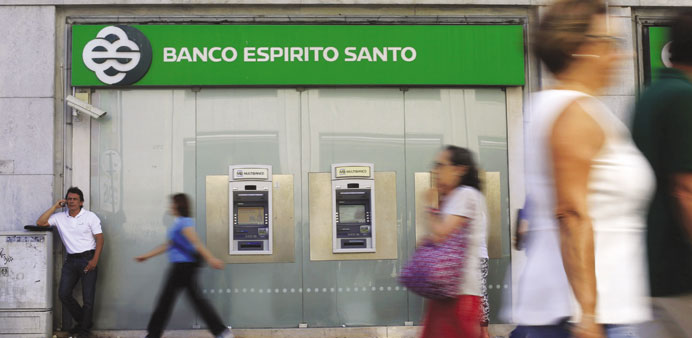People walk past an office of Portuguese bank Banco Espirito Santo in Lisbon. Shares in BES sank 40%, adding to its 42% plunge on Thursday when the bank posted a €3.6bn loss and higher-than-expected provisions to cover its exposure to companies owned by its founding Espirito Santo family.
Reuters/Paris
European stocks sank in huge volumes yesterday for the third straight session, with a broad index hitting a 3-1/2 month low, hurt by concerns over losses at Banco Espirito Santo as well as tension between Russia and the West.
Shares in Banco Espirito Santo sank 40%, adding to its 42% plunge on Thursday when the bank posted a €3.6bn loss and higher-than-expected provisions to cover its exposure to companies owned by its founding Espirito Santo family.
The massive loss at the Portuguese lender has dragged Europe’s banking sector index down 3.5% this week, reviving concerns over the sector, particularly in southern Europe, hit hard by the years-long sovereign debt crisis.
Portuguese authorities are considering the use of public funds to shore up Banco Espirito Santo’s capital, complementing new money from investors, people close to the process said yesterday.
Banco Espirito Santo has been targeted by hedge fund short sellers, betting on the stock to drop.
According to data from Markit, about 6% of the group’s shares are out on loan, making it one of the most shorted stocks across Europe. The paper gain for hedge funds this week on Banco Espirito Santo’s stock meltdown represented roughly 110mn euros ($147mn), according to Reuters calculations.
Short selling – a trading strategy popular with hedge funds – involves borrowing a security and selling it, betting that the price will fall. Short sellers then buy it back at a lower price and return it to the lender, pocketing the difference.
The FTSEurofirst 300 index of top European shares ended 1.2% lower yesterday, at 1,332.68 points, a level not seen since mid-April.
“The situation in Argentina, the problems with Banco Espirito Santo and geopolitical tensions, particularly with Russia, are fuelling this bout of profit taking,” Barclays France fund manager Philippe Cohen said.
The eurozone’s blue-chip Euro STOXX 50 index lost 1.4%. Germany’s DAX fell 2.1%, with trading volumes nearly twice the index’s average daily volume in the past three months.
Technical charts sent a strong negative signal on the DAX, with the index breaking below its 200-day moving average for the first time in two years.
Investors have been worrying about the impact of sanctions against Russia. About 40 European blue-chips, including many German companies, derive more than 5% of their revenues from the Russian market.
Adding to investors’ concerns, data showed yesterday eurozone manufacturing growth failed to accelerate as expected last month despite factories barely raising prices, with growing tensions in Ukraine weighing on sentiment.
Spanish stocks also underperformed again yesterday, with Madrid’s IBEX dropping 1.8%, as traders cited worries over Spanish companies’ exposure to Latin America following Argentina’s default.
European shares slightly trimmed losses in afternoon trading after data showed US job growth slowed more than expected last month, soothing concerns of an early interest rate hike.
The Labour Department said yesterday nonfarm payrolls increased 209,000 last month after surging by 298,000 in June, missing economists’ expectation of an increase of 233,000 jobs.
“The number was a fairly big miss, but it means the Americans may hold off a little bit longer from raising rates,” said Joe Neighbour, trading analyst at London-based firm Central Markets.

